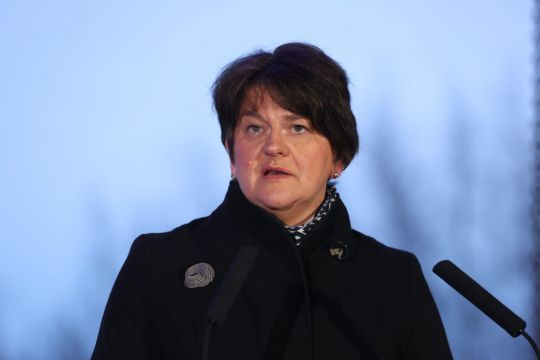A Swiss-style deal on agri-food shipments to Northern Ireland would only partially solve post-Brexit trade disruption, Arlene Foster has said.
The DUP leader and Stormont First Minister said while the arrangement could address issues around animal and plant health checks it would not alleviate new customs red tape associated with the Northern Ireland Protocol.
Mrs Foster has said the only sustainable way to address issues related to the protocol is to ditch it completely.
Her comments came ahead of a series of meetings on Thursday that will see the EU and UK government canvas the views of traders and other civic society representatives in Northern Ireland on the impact of the new Irish Sea trade arrangements.

The Swiss model has been suggested as a way to ease disruption on Great Britain to Northern Ireland shipping.
Under the terms of the protocol, which ensures a free-flowing border on the island of Ireland, the region has remained in the single market for goods.
That means products entering the region from Great Britain must comply with strict EU rules on animal and plant health.
Traders must now comply with a range of new processes and checks to ship animal-based food products and plants across the Irish Sea into Northern Ireland.
The agreement the EU has with Switzerland avoids such checks because the Swiss align their own regulations on animal and plant health with the bloc’s.
When the EU changes its rules, the Swiss change theirs to ensure continued alignment.

Mrs Foster stressed that the protocol was about more than animal and plant health checks.
She highlighted that businesses also have to comply with fresh declaration requirements as a result of Northern Ireland having to apply EU customs rules at its ports.
The DUP leader noted that customs declarations would be required on parcels being sent from GB to NI from April.
“The Swiss-style arrangement of course only deals with one aspect of the protocol, it only deals with SPS (sanitary and phytosanitary) checks and only then if the whole of the United Kingdom is prepared to align with the European Union,” she said.
“So it doesn’t actually deal with all of the other issues around parcels and around business and all of those other issues, so it’s only a part of the solution and only if the United Kingdom Government would buy into the entirety of the UK aligning.
“So for us what we’re really interested in is a long-term solution, a permanent solution to the problems that we’re currently facing.”
The protocol is not yet fully functioning as a number of grace periods are in operation that limit the number of certifications and declarations required to move goods.
These exemptions will lapse at different points in the weeks and months ahead.

The Ulster Unionist Party, which is also campaigning for the protocol to be axed, has voiced support for a Swiss-style deal as a way of reducing some of the bureaucracy, which is set to ramp up significantly when a grace period covering supermarket goods ends at the start of April.
The DUP and UUP are demanding action amid mounting anger among Northern Ireland unionists and loyalists at the economic barriers Brexit has created between the region and the rest of the UK.
UUP leader Steve Aiken has urged all of Stormont’s five main parties to jointly call for a reduction on the processes around shipping agri-food products.
He said there was no contradiction in supporting a Swiss deal at the same time as campaigning for an end to the protocol.
“One of the things we should do is be looking at everything we can do to minimise what’s happening right now and if there’s going to be some form of recognition of agricultural produce that means that a large chunk of that Irish Sea border disappears, why wouldn’t you want to support that?” he told BBC Radio Ulster.
“Let’s put Northern Ireland first, because that’s where the real impact is – it’s in our consumers, it’s in our agri-business.”

Retail NI, the body that represents small retailers in Northern Ireland, said the grace periods should be extended.
UK cabinet office minister Michael Gove has urged the European Commission to grant extensions to January 2023 to provide space to find resolutions.
Glyn Roberts, chief executive of Retail NI, told Stormont’s infrastructure committee there was an onus on the UK and EU to demonstrate flexibility.
“It’s not just about extending these grace periods just for the sake of it and kicking the can down the road,” he said.
“We do need long-term solutions to these challenges.”
Earlier, DUP Economy Minister Diane Dodds said she would not be opposed to a Swiss-style deal as a “short-term” fix.
But she questioned whether the government would sign up to such an arrangement.
Mrs Dodds, a long-standing Brexiteer, said such a deal would result in the UK “slavishly” following EU rules.
However, she added: “I’m not against anything that will bring any short-term relief. And I’m not against a Swiss-style deal in and of itself.”
The minister said such an agreement would mean the whole of the UK would have to align with EU rules on animal health and plant safety.
“I didn’t think that that would be something that the government would run with,” she told BBC Radio Ulster.
“And even if this government did run with it, another government might not run with it.”







